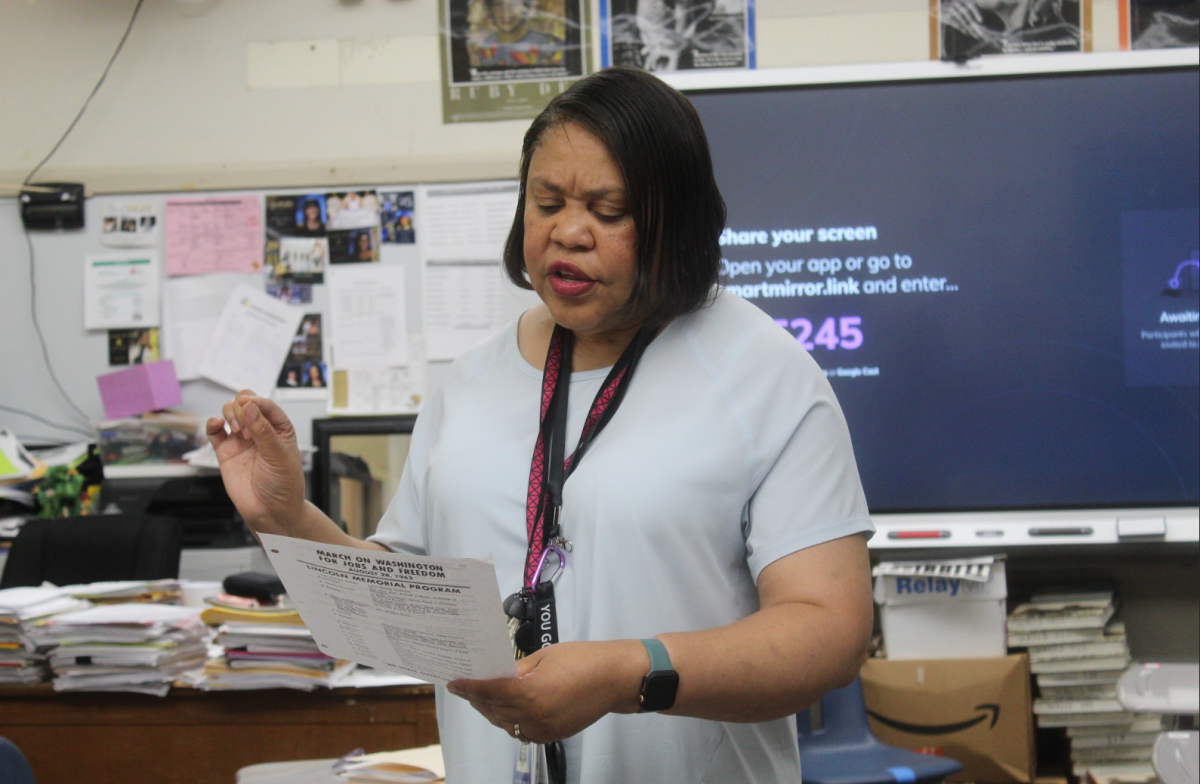Teachers were preparing their classrooms and gathering materials on the afternoon of Friday, Aug. 11 when the Arkansas Department of Education (ADE) removed course credit for AP African American Studies. Designed and administered by the College Board, the course is in its second pilot year and is currently offered at six Arkansas schools. In a phone call with Barbara Stafford, the school’s gifted and talented coordinator, the ADE stated that the class would not count towards the state’s graduation requirements, and unlike other AP courses, the state would not cover the cost of the AP test in May which enables students to receive college credit. In addition, the class was officially deleted from the ADE’s course code management system less than three days before the beginning of the new academic year.
“I was just devastated,” said Ruthie Walls, AP African American Studies teacher and regional consultant for the College Board. “I came into my room to refocus. I had to consider the fact that I have 98 students who will be at school on Monday morning, so I really had to push past the emotion and focus on what needed to be done.”
While the initial explanation for the recent policy change was unclear, a statement released by the ADE Monday, Aug. 14 made clear that state officials believe the course potentially violates the LEARNS Act, the educational reform package signed by Governor Sarah Huckabee Sanders in March which includes provisions targeting indoctrination and the teaching of critical race theory.

“The department encourages the teaching of all American history and supports rigorous courses not based on opinions or indoctrination,” the statement said. “Arkansas law contains provisions regarding prohibited topics. Without clarity, we cannot approve a pilot that may unintentionally put a teacher at risk of violating Arkansas law.”
Governor Sanders further criticized the course during a Thursday, Aug. 17 appearance on Fox News, imploring teachers to “get back to the basics of teaching math, reading, writing, and American history.”
“We cannot perpetuate a lie to our students and push propaganda and a leftist agenda, teaching our kids to hate America and hate one another,” Sanders said.
Controversy surrounding AP African American Studies in Arkansas began in the spring when state Secretary of Education Jacob Oliva announced the ADE would be opening an official review into the course over concerns the class included potential indoctrination. As part of this process, Oliva observed an in-class discussion led by Walls.
“It was April. I went to Principal [Nancy] Rousseau’s office to share with her a lesson plan that I was working on, and she told me that Mr. Oliva would be coming to the class,” Walls said. “We did not have any notice, so we were not able to communicate with his team beforehand. With that being said, the students were pretty familiar with people dropping in and out of the classroom anyways, so we just continued our normal activities.”
That day, students discussed primary sources and analyzed the 1919 Elaine Race Massacre, a violent incident of racial terror in which several hundred African American civilians were killed.

“That was the local Arkansas history, but we were able to connect it to the AP African American Studies curriculum because that incident was tied to the Great Migration, which was a national event,” Walls said. “So Mr. Oliva did sit through that particular lesson, and after he left, I provided him with a copy of this year’s curriculum. I invited him to take a look at the document, and if he had any questions, to please contact me directly and that I would be more than happy to explain anything in the curriculum.”
Although Oliva did not contact Walls directly or provide specific feedback, he was supportive in his communication with Mrs. Rousseau after observing the course.
“She did tell me he was very complimentary of the students in the class and the lesson that was being taught. He enjoyed his visit. That was the last feedback that we received,” Walls said. “And then we were blindsided.”
Head counselor Kim Williams was similarly surprised by the policy change in light of Olivia’s original comments.
“Secretary Oliva told Mrs. Rousseau and a number of people after his visit that Mrs. Walls’ lesson plan was wonderful, so hearing of this sudden change is very discouraging,” said Williams. “But I knew what the students and everyone in our district was going to do in response. We’re going to push forward”
In a statement Aug. 16, district administration expressed its continued support of the course despite the ADE’s resistance.
“LRSD has taken a proactive step to recognize the importance of diversity and inclusivity in our curriculum,” the statement said. “As part of our commitment to providing a rich and comprehensive learning experience, we will continue with our plans to offer the AP course. This course will be weighted the same as all other AP courses. Students will be able to take the AP exam, and the District will ensure students will not have to pay for the exam. We will also continue to work closely with the College Board regarding content and curriculum.”
Williams said multiple community organizations and individuals from across the country have expressed interest in covering the cost of the upcoming AP exams, so payment was never going to be a barrier to students who are interested in taking the class. However, he was originally worried about other districts which may not have the resources or network to find funding.
Despite this initial uncertainty about course credit and the cost of exams, students have maintained their interest in the course.
“If anything, the controversy has made the course that much more popular, and I believe we will double the amount of students that are enrolled in the class by next year,” Williams said. “The course went from 26 students in the original section last year to about 100 students this year.”
Additionally, school teachers and administrators have pushed back against the state’s assertions that the course’s framework includes critical race theory or political indoctrination.
“No one’s being indoctrinated,” said Williams. “This is an advanced placement College Board-created course, and it does not include critical race theory. I have the revised curriculum, I have read the revised curriculum, and I would challenge any lawmaker who thinks that this is leftist propaganda to do the same.”
Williams also criticized the ADE’s decision to review AP African American Studies while ignoring similar social studies courses.
“They don’t want to read the curriculum because they’re afraid of the truth. What’s being taught is an in depth study of African American history and culture,” Williams said. “It’s no different than AP European History as an in depth study of European history and culture. It’s no different than AP Spanish language and culture as an in depth study of Spanish language and culture. So why are we having this argument? It’s all political.”
Christopher Dorer, chair of the social studies department and AP World History teacher, claimed that objections to the course are unfounded and expressed a similar position.
“It’s not an issue of what’s in the curriculum. It’s an issue of empowering people of color to recognize that our system is and has been flawed, especially concerning the rights of Black Americans, and I think that this class has really frightened certain people who hold positions of power,” Dorer said. “I think it’s shocking that this class is the one being targeted, especially at a place like Central that is so integral in the story of 20th century civil rights.”
Walls echoed Dorer’s dissatisfaction with the ADE’s decision.
“Anyone that has attended Central knows the story of the Little Rock Nine, and we have visitors from all over the world. I am appalled that we have situations like this one occurring in 2023,” Walls said.
The conflict over the course’s future has not yet concluded. In a letter written to participating superintendents Aug. 21, Olvia requested that teachers submit all class materials “included but not limited to the syllabus, textbooks, teacher resources, student resources, rubrics, and training materials” by noon Sep. 8. He also requested that each send a statement of assurance that the course will not violate Arkansas law due to the ADE’s concerns about themes included in the course’s framework such as “intersections of identity” and “resistance and resilience.”
“The department is concerned that the pilot may not comply with Arkansas law, which does not permit teaching that would indoctrinate students with ideologies such as critical race theory,” Oliva said.
Meanwhile, Walls says she is not concerned about violating the law.
“I am an educator. I have to do my job and teach with integrity while making sure that students get the information they deserve no matter what,” Walls said. “I just try to stay on the right side of history, and I let others work out the details. Of course, I don’t set out to break laws, but we are teachers, and I take that responsibility very seriously.”

























Alicia T. • Sep 5, 2023 at 12:11 pm
Very good article! Kansas seems to be headed in the same direction sadly. I am so proud of my alma mater for staying their course. Once a tiger, always a tiger! Great work LRCHS!
Frederick Wetzel • Sep 1, 2023 at 12:16 pm
A great article and makes a person evaluate what our politicians are doing to education in this state.